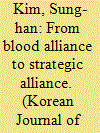| Srl | Item |
| 1 |
ID:
099675


|
|
|
|
|
| Publication |
2010.
|
| Summary/Abstract |
South Korea's strategic thought toward the United States has been evolving from a blood alliance during the Cold War era, to a transitional alliance during the post-Cold War era, and to a strategic alliance after September 11. Despite some trials and errors, South Korea has successfully adjusted itself to new strategic challenges by transforming and reinventing its alliance with the United States. As part of a soft-balancing strategy, this endeavor has been conducted in parallel with South Korea's improved relations with other major powers than the United States and its support for multilateral security cooperation so that the United States may not impose its own strategic preferences on South Korea. In these attempts, we can discover strategic elements that are realist (utilizing the U.S. as a strategic balancer between China and Japan), liberal (going beyond the military alliance), and constructivist (joining the regional community-building).
|
|
|
|
|
|
|
|
|
|
|
|
|
|
|
|
| 2 |
ID:
193638


|
|
|
|
|
| Summary/Abstract |
It is widely noted that China maintains a “special relationship” with North Korea, which is best epitomized by the Sino-DPRK Treaty of Friendship, Cooperation and Mutual Assistance that the two countries signed in July 1961. However, in the post-Cold War era, the raison d’être of this alliance treaty has been challenged. Against this backdrop, this paper traces China’s evolving interpretations of the Sino-DPRK friendship treaty. By investigating the process behind the signing of the treaty, it argues that Beijing signed an “alliance treaty” with Pyongyang to win over the latter in the context of the Sino-Soviet split. However, as China sought to improve its relations with Western powers, the Sino-DPRK friendship treaty became increasingly burdensome to Beijing. Thus, Beijing began to dilute the alliance nature of the treaty by no longer publicly affirming its security obligation toward Pyongyang. After Deng Xiaoping came to power in China, the treaty was found to be incompatible with Beijing’s newly promulgated foreign policy principle of non-alignment. To address this problem, Beijing ultimately reformulated the nature of Sino-DPRK relations and reinterpreted the Sino-DPRK friendship treaty—that is, China is not an ally of North Korea, and the Sino-DPRK friendship treaty carries only symbolic meaning without casus foederis. Based on these analyses, this paper claims that the security obligation of the Sino-DPRK friendship treaty is no longer functional.
|
|
|
|
|
|
|
|
|
|
|
|
|
|
|
|